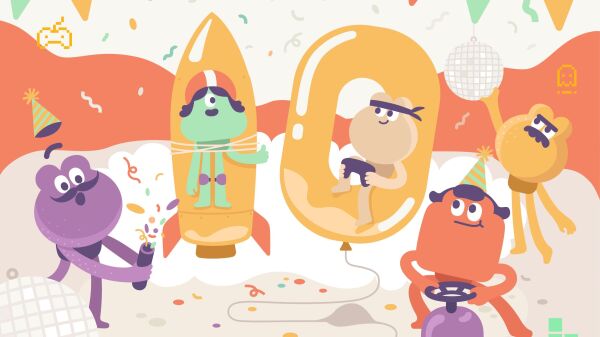Last year, Game Habitat celebrated 10 years in operation, and we did it with a bang! We invited all of south Sweden's game developers to a huge party in central Malmö.
Game Habitat was founded on 8 October 2013 by representatives of the game studios in south Sweden. The aim was for the organization to accelerate the growth of the region’s game development industry, which is still the mission.
To commemorate the 10 year anniversary, we threw a big anniversary party at Gränden in central Malmö, and more than 900 people (!) from our regional games industry community signed up for the event! Catch a few glimpses and relive the celebrations in the video above.
A decade, 10 years, might not sound like a long time ago. But last year's anniversary of course had us reflect a lot on Game Habitat's first 10 years in operation, and we realized that the regional game development industry had developed a lot during these years, and Game Habitat with it.
The first steps
When Game Habitat was created in 2013, there were 2600 game developers in all of Sweden, of which 454 were in south Sweden. Comparably, there were just 700 in all of Denmark. The 10 biggest regional studios were small compared to what they would look like just 10 years later. In 2023 there were more than 1700 game developers in south Sweden, plus more than 650 game students.
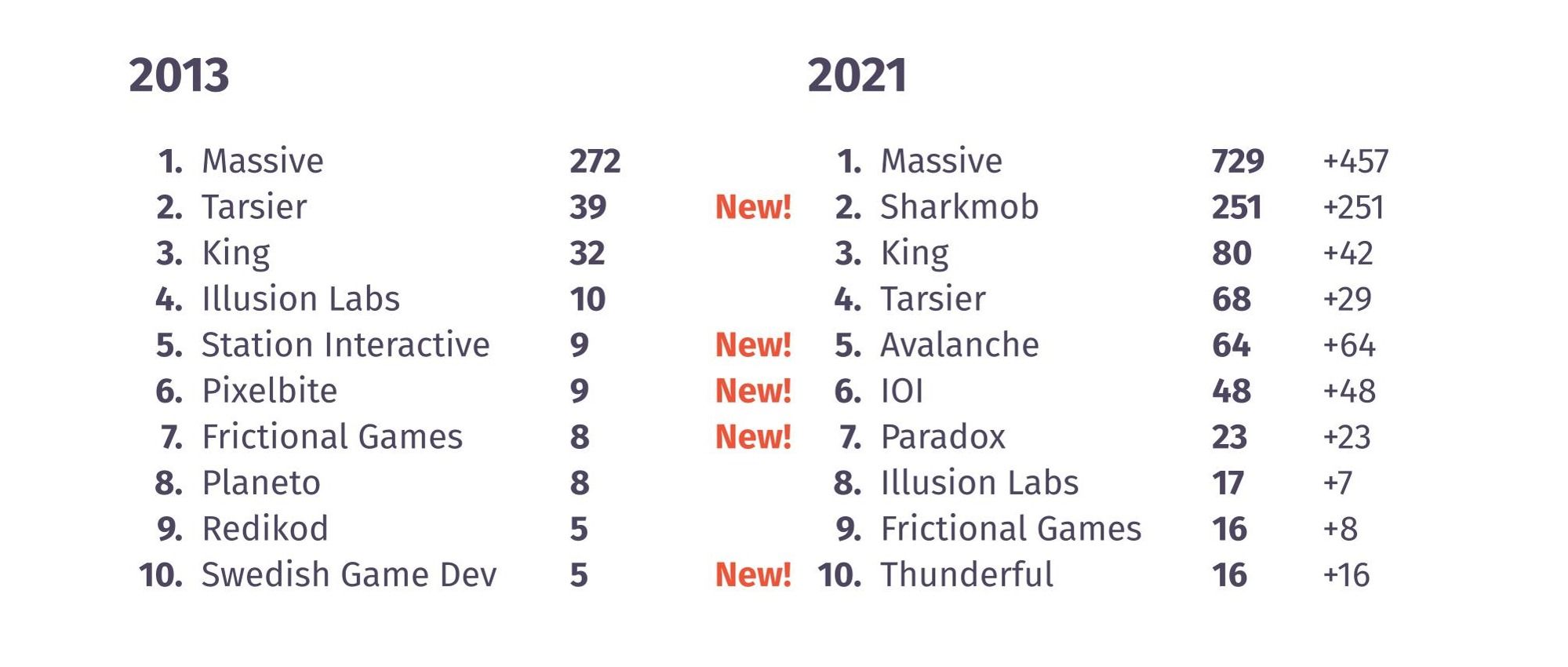
The table shows the biggest studios in south Sweden in terms of employees in 2013 and 2021 respectively. The 10 biggest studios alone added close to 1000 jobs in just eight years (945 to be exact). We'll take count for 2023 in a few weeks, publishing the results later in 2024, but we expect the growth have continued.
The major growth
Over the past 10 years, the regional games industry has grown rapidly, and today, the region with Malmö at the forefront, is home to one of the world's foremost game development ecosystems, known for its high-quality and innovative games. But currently, also for developing some of the world's biggest games, based on brands such as Star Wars, Avatar, and James Bond.
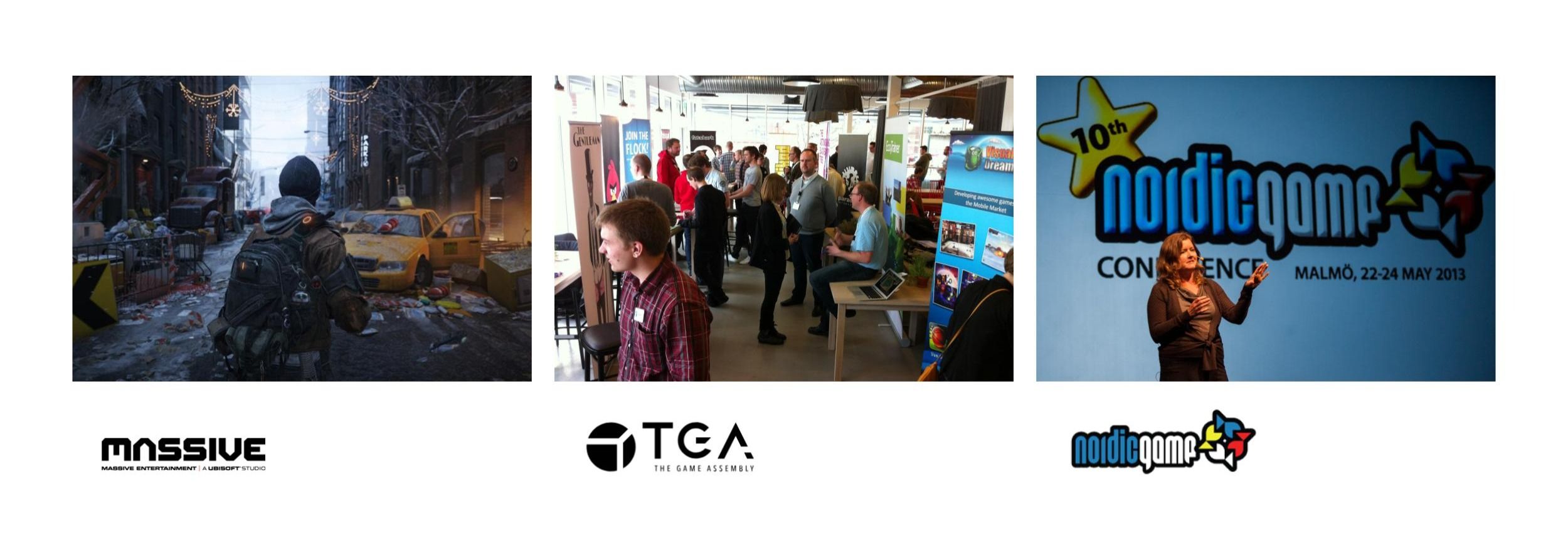
There are of course many reasons why Malmö and south Sweden has grown into the game development ecosystem that it is today. But looking back at the past 10 years, three key factors stand out as possibly the most important growth engines:
- The fact that Massive Entertainment, Sweden’s largest game studio which develops some of the world’s biggest games, is located in Malmö has been tremendously important. The studio was established already in 1997 in Blekinge in south Sweden, but moved to Malmö just a few years later. Over the years, Massive have attracted numerous talented game devs from around the world to come to Malmö to work, of which some has then moved on to start studios in the region themselves.
- The Game Assembly, a vocational education specifically for game developers, was established in Malmö in 2008 and has since been invaluable in providing the regional game studios with world-class talent. The Game Assembly has consistently been ranked among the world’s top game development schools.
- The Nordic Game Conference, the international game development conference established in 2004 in Malmö, has not only brought game developers from around the globe to Malmö, it has also created a meeting place and upskilling opportunity for regional developers.
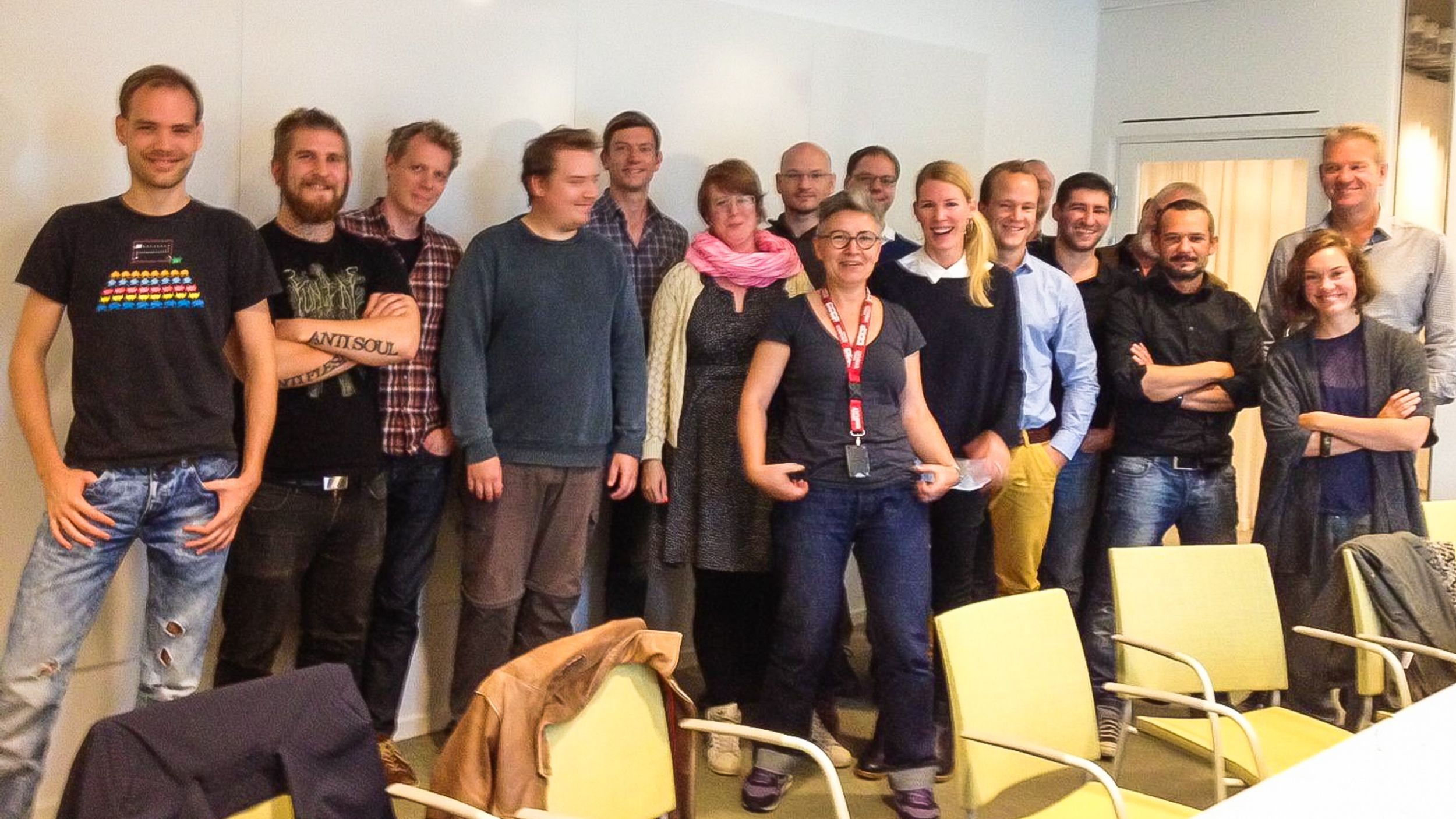
Grainy image from the Game Habitat founding meeting in 2013. From left to right: Marcus Kellner, Johan Toresson, Dennis Gustafsson, Calle Leppäjoki, Fredrik Olsson, Emma Mellander, Ola Holmdahl, Ann-Sofie Sydow, Niklas Hansson, Jenny Berg Nilsson, Peter Lübeck, Martin Walfisz, Sten Selander, David Polfeldt, Karin Ryding, Erik Robertsson
Reaching beyond
During Game Habitat’s very first year, a vision to guide the new organization's work was put together:
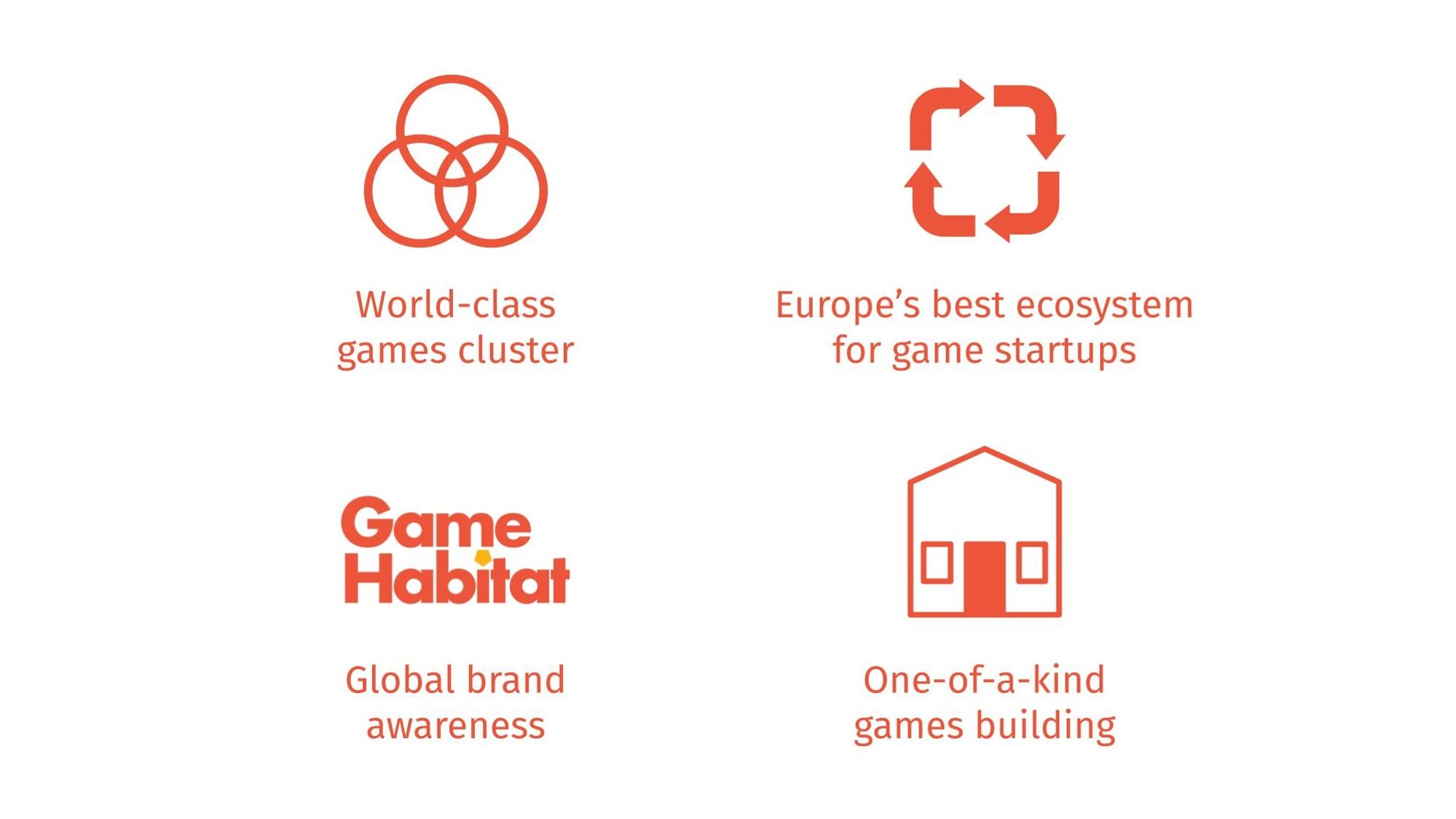
And a regional employee growth projection was made:
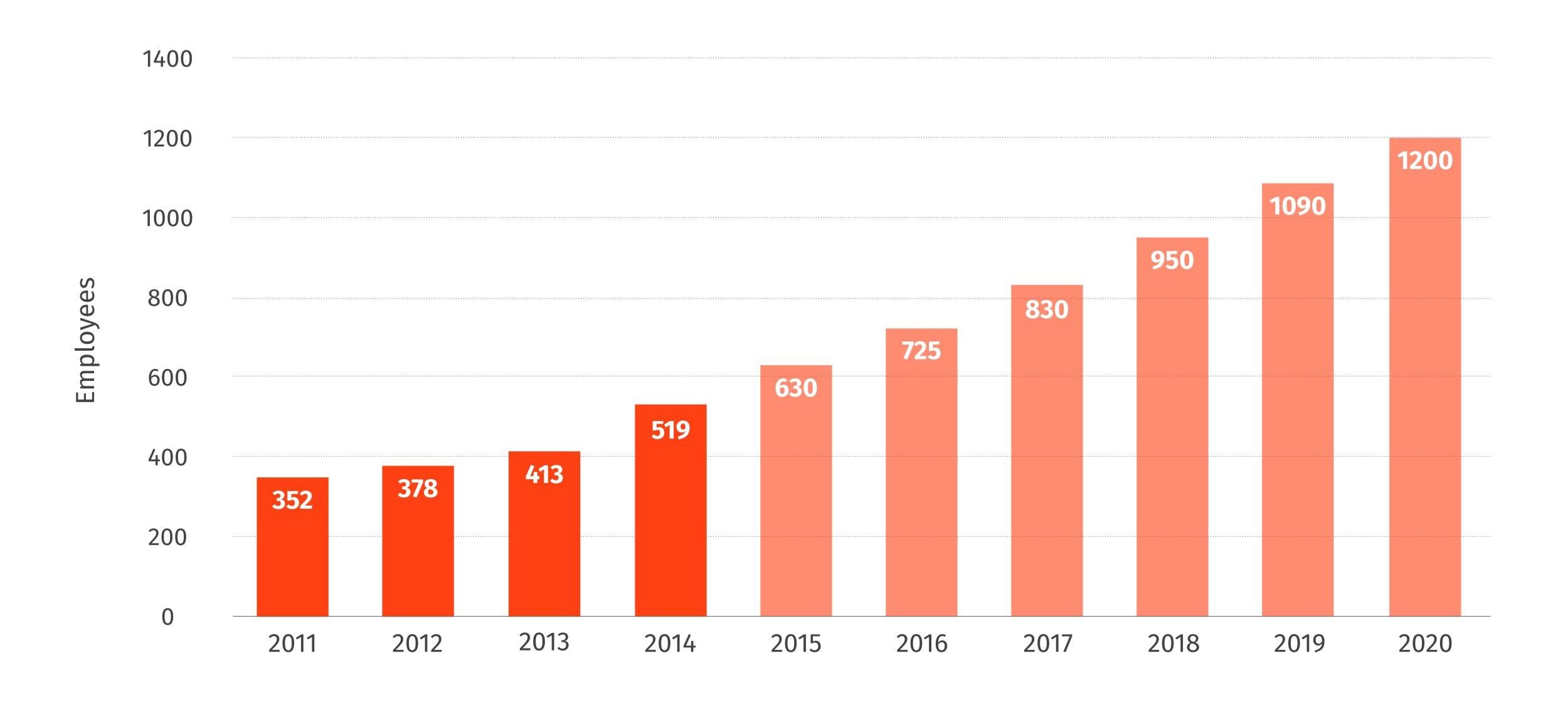
The vision and the employee projection were bold, to say the least. Nevertheless, 10 years later, the results are in, and the employee projections were met and then some, and the vision was, to a very large extent, fulfilled. Game Habitat and the regional game development ecosystem had grown well beyond imagination.
Let’s look at the employee projection and each part of the vision individually.
Employee growth
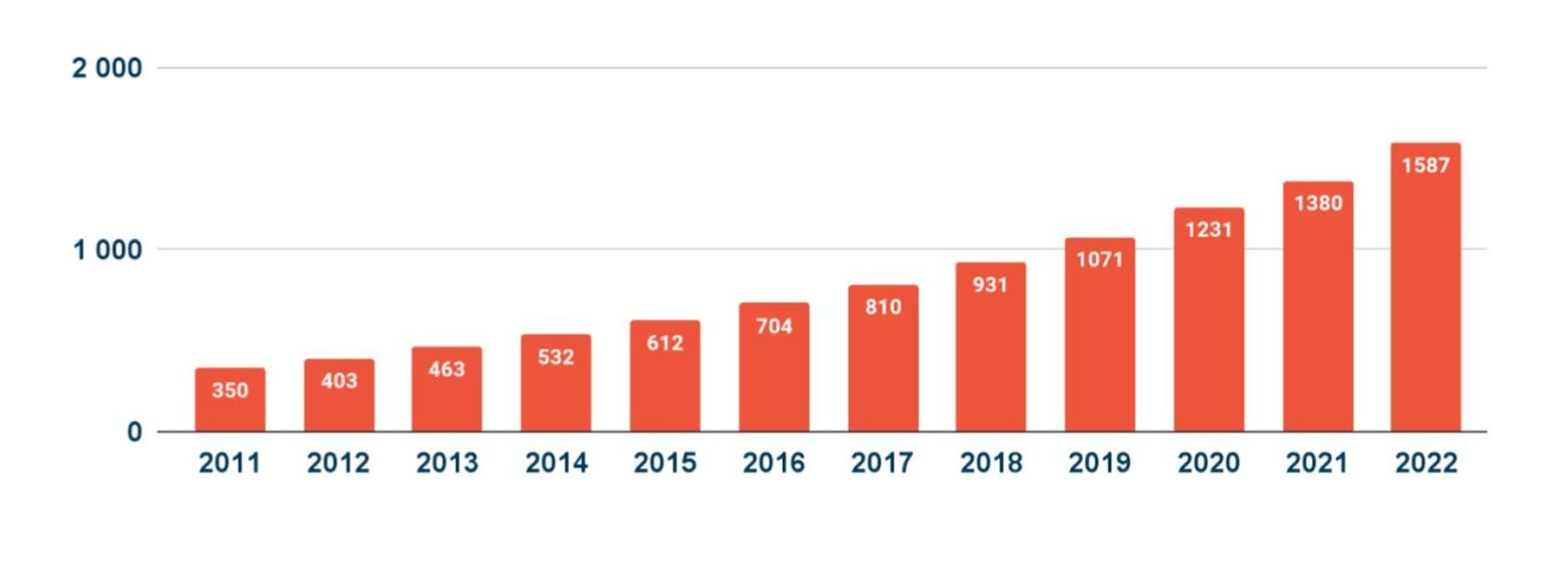
This is the game developer employee growth in south Sweden over the years 2011 to 2022 - an annual average increase of 15%. Almost identical to the projections, which at the time felt bold. Alongside the increase in employees, the number of game companies in the region also increased dramatically over this time period. From 25 in 2013, to 149 in 2022.
World-class game cluster
What about the vision set out in 2013? Is the region a world-class game cluster? Well, yes, according to the people working here.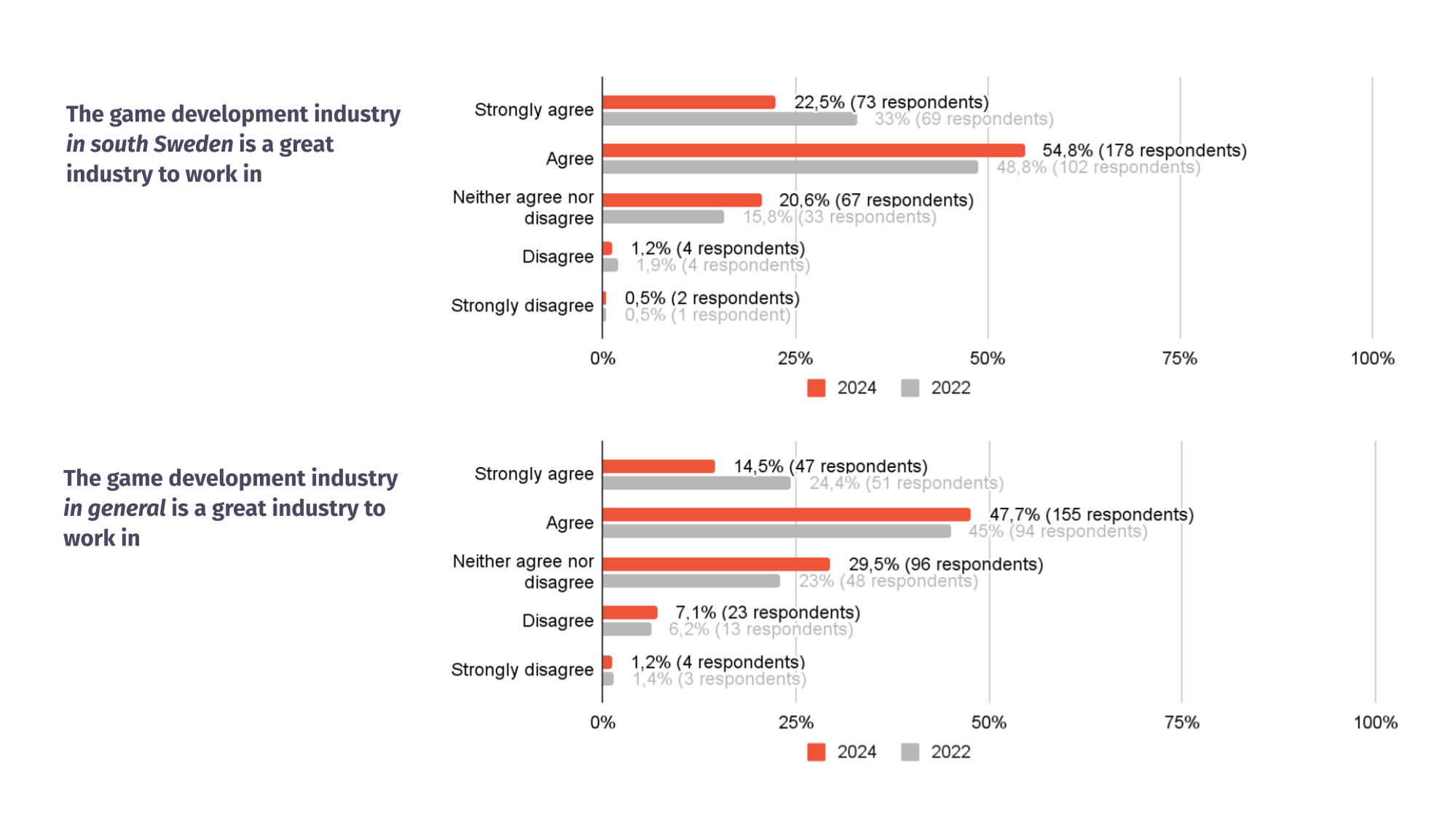
These graphs are taken from our upcoming regional industry report where we, among other things, asked regional game developers what they think about the region’s game development cluster and the games industry in general. And according to the responding game developers, south Sweden clearly is a world-class game cluster, more appreciated than the industry in general.
Why they think so? Because of the fact that the cluster include thousands of game developers and hundreds of game companies, plus many freelancers, students, and hobbyists. And because the cluster features actors from all around the game ecosystem, such as AAA and indie studios, education, service providers, publishers, and investors. And because studios in the region develop games for all platforms and in all genres. And because the region is home to studios renowned for their award-winning and impactful games, their original IPs, and for cultivating some of the biggest brands in entertainment. And because together, games made by studios in the region have been played by hundreds of millions of people worldwide. And because the regional game development industry is one big inclusive and welcoming community where studios and individuals communicate openly and support each other when needed.
Global brand awareness
Are we famous, is Game Habitat and the regional game development ecosystem known globally? It's hard to measure, but the data we've collected points to yes, we are.

This graph is also from our upcoming regional industry report, where we've asked game developers who moved to the region for work if they knew about us before coming to the region. A clear majority of the respondents say they knew about the region’s game development industry before taking up a job here. That in itself is an important number. But furthermore, the fact that the regional game development studios in 2022 had employees from at least 66 different countries around the globe, also speaks to the region's global reach.
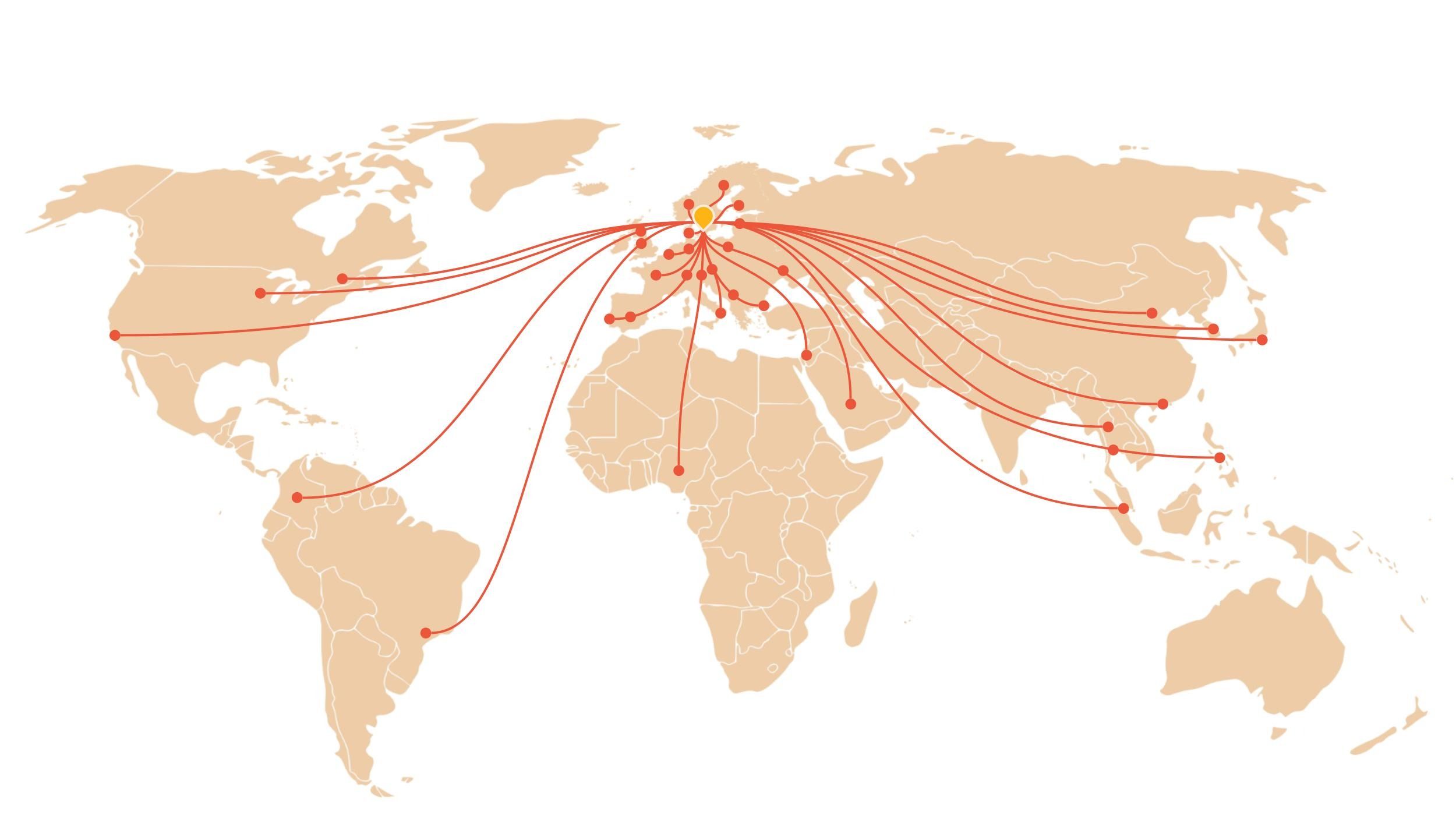
Another data point is this image, which is perhaps even more telling about the global reach our region has. This image maps the visits from around the world to Game Habitat in our first 10 years in operation - we’ve had visits from a lot of different places. Most visitors come to Malmö to visit us at Game Habitat to simply understand how such a relatively small place on our planet can be home to such a big and successful game development industry. To us, this image really demonstrates our region’s global brand.
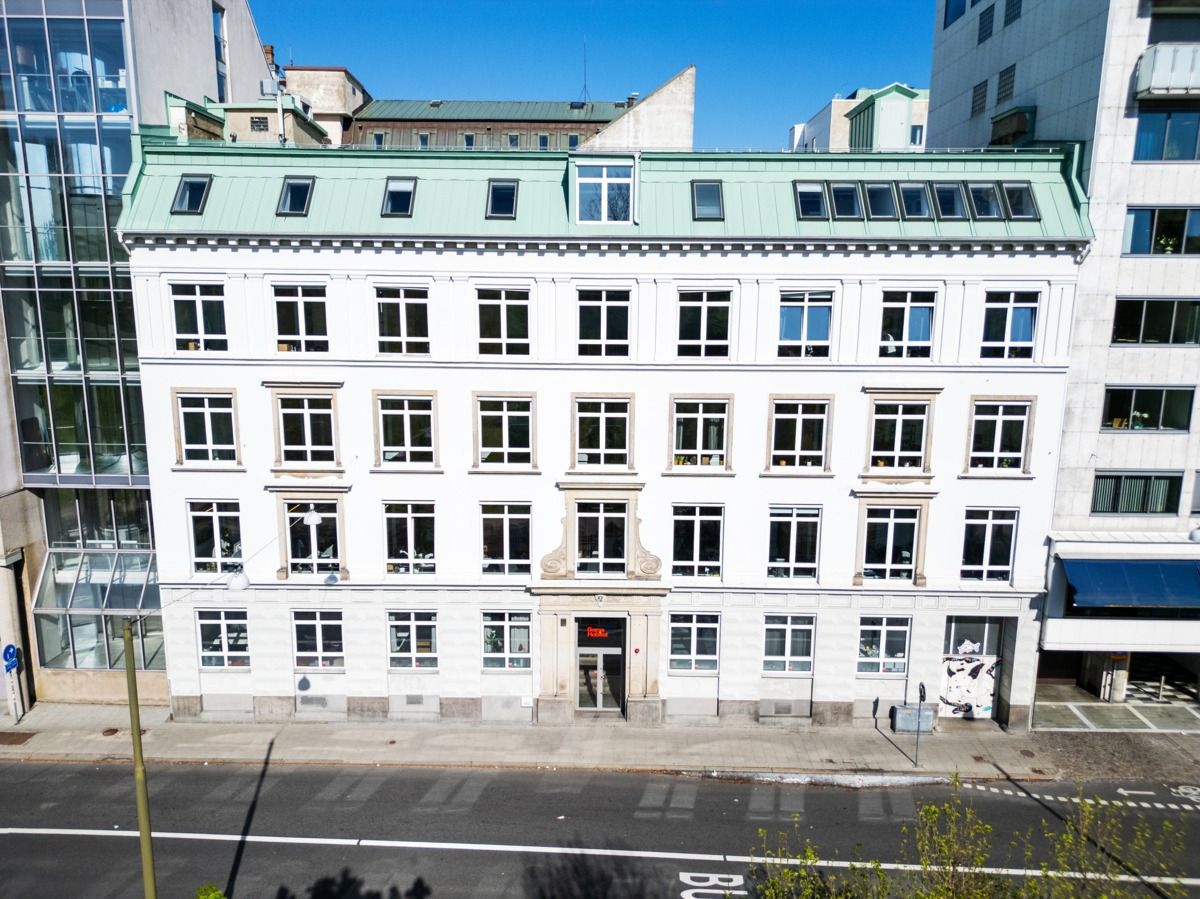
One-of-a-kind games building
Another important milestone set out in the vision in 2013 was to create a one-of-a-kind games building. And on 3 September 2018 we did just that when we opened the doors to Devhub in central Malmö - thus succeeding in fulfilling also this part of the vision! DevHub is a shared office building, dedicated to game development companies. As far as we know, DevHub is the world’s largest game development house.
Europe's best ecosystem for game startups
The fourth and last part of the vision layed out in 2013, is the vision to become Europe’s best ecosystem for game startups. This is the only part of the vision from 2013 we ourselves feel is lacking a few pieces in order for us to be able to mark complete. We are working on a few things to get there, including of course our newly launched Haven, but we still have work to do before we have a full ecosystem in place for game startups. Not to mention, turning it into Europe's best. Still, by the sheer number of successful game companies coming out of the region, we feel we’re clearly doing a lot of things right already.
Milestones 2013-2023
- 2013: Game Habitat is founded on October 8, and a working board is elected
- 2014: A survey to map the regional game development industry is conducted, showing 532 game developers working in the region
- 2015: Game Habitat's first employee is hired, the organization get public funding for the first time, and starts regular community meetings for everyone in the regional game development industry
- 2017: The team doubles, as Game Habitat hires its second employee
- 2018: Game Habitat founds the game development dedicated coworking space DevHub in central Malmö on September 3
- 2019: Game Habitat's biggest community meetings attract more than 400 game developers for the first time
- 2020: DevHub is operating at full capacity for the first time, with ca 25 game studios and 150 game developers in the house - as far as is known, it’s the world’s largest dedicated game development coworking space
- 2022: A new survey to map the regional game development industry is conducted, showing 1515 game developers and 120 game companies working in the region, Game Habitat and the game development industry in Malmö receives the city of Malmö’s award Malmö Ambassador of the year at Malmö Business Gala
- 2023: Game Habitat and DevHub turns 10 and 5 years respectively, the organization grows to eight employees, and the board adopts a new vision with increased focus on diversity, equality and inclusion
The future
Having delivered on our vision from 2013, we are now working with a new vision:
“By 2033, Game Habitat will have enabled south Sweden to become the world’s most diverse, equal, inclusive, and thriving ecosystem for global game development.”
The new vision puts increased emphasize on diversity, equality and inclusion (DEI), which has been a cornerstone of Game Habitat’s work for many years. The vision also reminds us to keep intact all the important pieces we’ve laid out so far which makes the regional ecosystem in south Sweden one of the world’s best for game development.
We are extremely proud of everything our regional games industry has achieved so far, but we’re possibly even more excited about the years to come! Mark your calendar for Game Habitat’s 20 year anniversary in 2033, and we’ll let you know how this region continued to make great games, fostered new successful game companies, and maintained an inclusive and diverse game developer community.
Lastly, a tip for Swedish speakers, Game Habitat's CEO Peter Lübeck recently was a guest at the podcast Spelskaparna where he deep dived into the history of Game Habitat and the regional games industry, so if you're curious for more information, catch the episode here (in Swedish).
